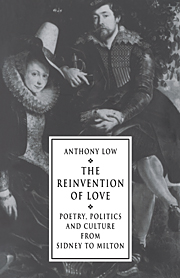Book contents
- Frontmatter
- Contents
- Preface
- Introduction
- 1 Sir Philip Sidney: “huge desyre”
- 2 John Donne: “Defects of lonelinesse”
- 3 John Donne: “the Holy Ghost is amorous in his Metaphors”
- 4 George Herbert: “the best love”
- 5 Richard Crashaw: “love's delicious Fire”
- 6 Thomas Carew: “fresh invention”
- 7 John Milton: “Because wee freely love”
- 8 John Milton: “Haile wedded Love”
- Conclusion
- Notes
- Index
6 - Thomas Carew: “fresh invention”
Published online by Cambridge University Press: 02 October 2009
- Frontmatter
- Contents
- Preface
- Introduction
- 1 Sir Philip Sidney: “huge desyre”
- 2 John Donne: “Defects of lonelinesse”
- 3 John Donne: “the Holy Ghost is amorous in his Metaphors”
- 4 George Herbert: “the best love”
- 5 Richard Crashaw: “love's delicious Fire”
- 6 Thomas Carew: “fresh invention”
- 7 John Milton: “Because wee freely love”
- 8 John Milton: “Haile wedded Love”
- Conclusion
- Notes
- Index
Summary
Coming from the direction of the twentieth century, a reader might not notice what is perhaps the most radical quality in Thomas Carew's love poetry, since that quality consists in an absence: the virtual absence, for the first time since Wyatt, of the Petrarchan tradition in any of its moods and variations. True, from the beginning, English Petrarchists, like their Italian predecessors, indulged in mockery and undermined the tradition with cynical demurrals and pragmatic insertions. Even in the hands of iconoclasts like Donne, however, the basics persisted: distorted, mocked, fought against, yet ultimately still a determining force.
As in politics Donne could rail against the patronage system, so in love he could protest Cupid's “vast prerogative,” yet find no workable substitute for either of them, other than withdrawal from the world and society. Eventually, variations of Donne's solution – private love and the nuclear family as havens against a threatening world – would find wide acceptance, and privacy would, as it were, become socialized. But that outcome would have to wait at least a century before the right social, economic, and psychological conditions came into place to allow it wide expression. In Donne's time such conditions were not yet generally available to allow the version of idealized love expressed in the Songs and Sonets to take firm hold. As we have noted, even Donne himself, in his later poems and sermons, reverted to more traditional, conservative views.
- Type
- Chapter
- Information
- The Reinvention of LovePoetry, Politics and Culture from Sidney to Milton, pp. 132 - 157Publisher: Cambridge University PressPrint publication year: 1993



